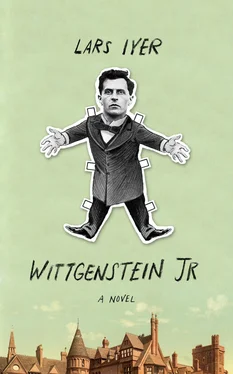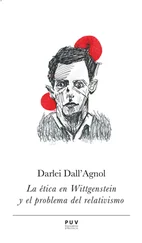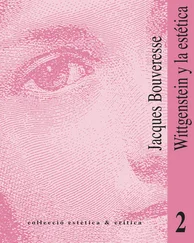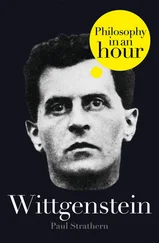His brother told him to see himself as an illicit thinker, Wittgenstein says. As a secret scholar. There was his ostensible work, concerned with metatheoretic reasoning and idempotence , on which he would no doubt publish a few articles, which he would discuss at a few learned symposia, Wittgenstein says. And then there was his real work, of which he must tell no one, his brother advised. Work only for after hours, when everyone is asleep. There was the work he’d told the Cambridge dons he’d come to the university to do; and there was his real work, of which he should say nothing to the dons …
If the dons only knew of their secret work! his brother said. If they only knew where their fundamental work in philosophical logic was leading them! If they only knew that their logical project could only mean the destruction of Oxford, of Cambridge, of the dons, of it all!
• • •
We stop by the duck pond.
His brother warned him about the dons, Wittgenstein says. Don’t trust them! , his brother said. Keep an eye on them!
The dons of Cambridge would be his warders, his brother said. His prison guards. (Just as the dons of Oxford were his warders, his prison guards.) Oh, they’d seem very gentle; they’d seem to be the easiest-going people he could find. They’d be full of soft skills , the dons of Cambridge (just like the dons of Oxford). They’d be full of words of kindness . But that would be when they were at their most deadly, his brother warned: when they were speaking words of kindness .
He shouldn’t be fooled by a smiling don, his brother told him. He shouldn’t allow himself to be lulled by a don. Charmed by one. He should never get too close to a don, his brother said. Never allow himself to be befriended . He shouldn’t take tea with a don, or join a don at the high table, his brother said. There should be no after-dinner drinks with a don. No evening constitutionals .
He should isolate himself, his brother said. He should become an island . Turn up for events to which he was required to turn up; speak when he was expected to speak, and leave it at that. Render unto Caesar the things of Caesar, and keep his soul for his work.
His brother spoke of the danger of the dons, Wittgenstein says. Of the threat of the dons. Dons were more dangerous than they seemed, his brother said. Dons could go for the throat , his brother was sure of that.
His brother had heard of scenes of savagery among the dons. Scenes of violence . Whole packs of dons would go out to hunt, in the guest lectures and seminar series of Oxford. Donpacks, out to bring back meat to feast upon.
He’d seen them in his mind’s eye, his brother said: great dons, like lions, chewing on bones; lesser dons, like hyenas, sucking on the bones left by other dons; still lesser dons, like birds of prey, flapping round the corpse …
Of course, dons could be gentle , too, his brother acknowledged. Dons could be tender, even kind . When they first scented spring in the air, dons would become dreamy and sentimental. When the first spring breezes ruffled their hair, dons would close their eyes and sigh …
In the high summer, dons would sit out on the grass like resting lions, his brother said. They’d picnic on the lawn, like kings at peace. They’d recline in their deckchairs, laying their Loeb editions facedown on the grass.
Autumn lent the dons a valedictory air, his brother said. In autumn, when the first leaves were falling from the trees, the dons would know a gentle melancholy. Sometimes a tear would appear in the eye of a melancholic don. Sometimes a don would let out a great sigh, as he sat in his leather armchair by the fire.
In winter, the dons were inert, eyes glazed over, his brother said. Drowsy, like a winter wasp. Half hibernating by the fire, a glass of sherry in the hand …
But he should never be fooled, his brother told him. He should never let down his guard.
The mood of the dons could change quickly, his brother said. Like a bushfire that suddenly changes direction. You couldn’t predict them. You couldn’t anticipate them. Their moods were unstable. They were easy to stir, easy to panic. They were susceptible to rumour, to gossip. They were as sensitive as antelopes. A sudden movement, and they’d bolt — a herd of dons leaping over the savannah.
Above all, he should never show fear to a don, his brother said. He might be afraid of them, but he should never show his fear. That’s what his brother had learnt. The best thing would be for the dons to take him as one of their own. As a kind of honorary don, an honorary fellow. He should try, as best he could, to mirror the dons. His brother advised him to ape their gestures, their turns of phrase. To mimic their body language. Their dress . To try to blend in with the dons — they’d appreciate that.
Of course, not for one moment would they take him for a don — they would not be so easily fooled, his brother said. Not for one moment would they take him for one of their kind. But they’d appreciate the gesture of his would-be donnishness. They’d smile when they witnessed his no-doubt inept attempts at becoming a don. It would be as though he were a child, playing at dressing up, his brother said. And the dons, despite everything, are fond of children …
Doyle’s rooms. A soirée.
Tonight’s performance: the madness of Nietzsche.
Guthrie, the star, is unconscious. Doyle smears mustard under his nostrils. No response. Doyle squirts wasabi through his lips. Still nothing. Titmuss volunteers for the part, and sellotapes a moustache under his nose.
Titmuss/Nietzsche’s last moments of sanity, watching a horse (Benedict Kirwin) being beaten in the Turin marketplace. Titmuss/Nietzsche, flinging his arms round the horse, and weeping.
TITMUSS/NIETZSCHE: You must have chaos inside you, if you are to give birth to a dancing star. What doesn’t kill you makes you stronger. When you look into an abyss, the abyss also looks into you .
Titmuss/Nietzsche slumps. Applause from the audience.
Change of scene.
The demented Nietzsche never regained consciousness, Doyle says. Everyone ponders Guthrie.
EDE: He’s actually drooling.
MULBERRY: You go, Guthrie! Give an Oscar to droolio!
Guthrie has something, we agree. Presence. He’s like an Olivier of the immobile. Even his inertia is profound. As though he bore all the weight of existence! All the burden of being!
DOYLE (playing Nietzsche’s sister): Friedrich! Friedrich! Wake up!
Guthrie half snores. Sniffs.
DOYLE/NIETZSCHE’S SISTER: Friedrich! Herr Hitler has come to see you!
Guthrie seems to stir. His eyes half open. Then his head slumps onto his chest.
More applause. Doyle bows. A triumph! Bravo!
Black Zombies all round.
TITMUSS: Do you reckon you have to be mad to really think?
MULBERRY: Wittgenstein’s mad. Quite clearly.
EDE: Wittgenstein’s brother went mad. Then killed himself.
DOYLE: It must run in the family.
EDE: I had a mad uncle.
MULBERRY: Mad uncle Ede — must be from all that inbreeding. Did he really think ?
EDE: I don’t know. He really thought he was a parrot. Or a squirrel, depending on the day.
Another round of Zombies.
Spin the bottle.
The usual questions: Ever done it out-of-doors? Anally? With a member of the same sex? The opposite sex? Favourite sexual fantasies?: the secretary (Chakrabarti) … the nurse (Titmuss) … the dominant woman (Alexander Kirwin) … the virgin flower, atremble in your arms (Benedict Kirwin), the threesome (Benedict Kirwin again), the foursome (Benedict Kirwin yet again), a Roman orgy of women (Benedict Kirwin has a lot of fantasies) …
Читать дальше












